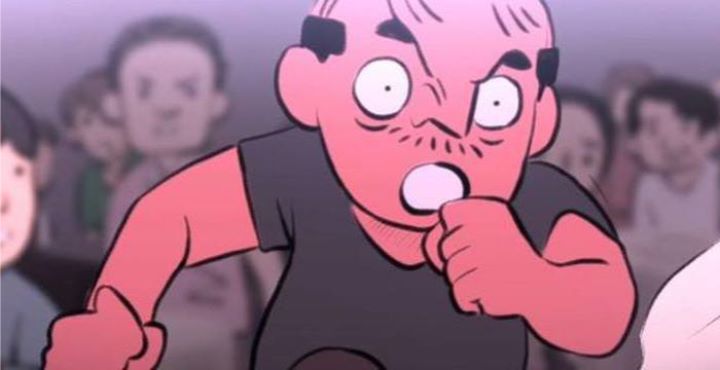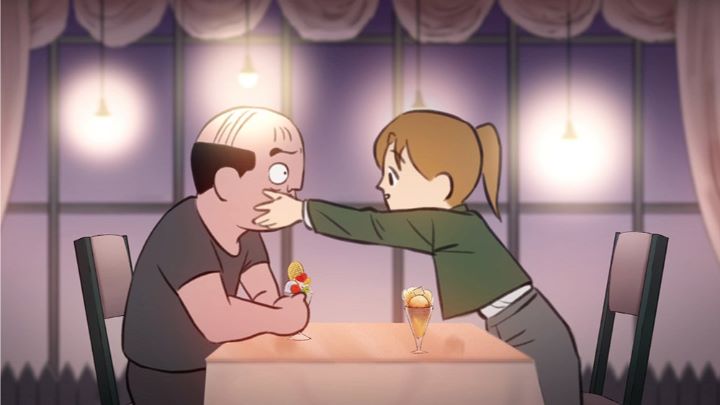








In 2017, the Ottawa Internation Film Festival (OIAF) selected that four out of five of its feature films in competiton would be from Asian countries. This was rare for the festival, despite most of the world's animation coming from Japan (albiet few "independent" productions come from Japan, which may have had something to do with this). Two were from Japan, two were from South Korea. South Korea had struggled in gaining a foot in the animation industry before, despite still being used for outsourcing cheaper productions. Of the two films, "I'll Just Live In Bando" is a unique work that owes much to its director. While not a perfect production, it provides an entertaining story and a relatable point-of-view, and I will look forward to what director Youngsun Lee makes next (although the film does not list a "studio," so whether or not more works come is up in the air). While without an American distribution partner about six months after its debut in Canada, I think it bodes well for the future of South Korea's place in animation, although perhaps I am just being hopeful.The story is about a balding middle-aged man in South Korea (how many films can you count that share this trait?) named Jun-Koo. He has a family with two kids, and has worked for a long time as a struggling actor. He was lucky to get a few small roles early in life, but lately hasn't had any roles, and instead works as a part-time drama lecturer at the local University while continuing to seek acting roles. The family gets by, and the students seem to like him as a teacher, but his wife, while normally supportive of his acting career, is getting impatient: they are barely getting by, and Jun-Koo''s position has no benefits or job-secuirty... surely the University would have promoted him by now given the years he's worked there? When Jun-Koo happens to save a neighbor, an elderly professor also working at his school, they have a moment in the emergency room. The professor admits he is getting old and is planning to retire, and would like to nominate Jun-Koo to take his position as a full-time faculty member. Around this time, Jun-Koo also received a call from his agent that he has the chance to audition for a new role, the first audtion he's had in years and the largest role he's had in his career. He finds himself at a crossroads. Does he accept the faculty job and settle down, for both his sake and for his family? Or does he continue to follow his passion for acting? He cannot do both.This perspective is rarely explored in film or books, and it is one I happen to relate to very strongly. Few creative fields are easy to get into, and many with the passion and talent are forced to get "real" jobs to pay bills while waiting for that golden opportunity. Even when that opportunity comes, these are fleeting, and these fields require you to constantly fight to get work even if you have the experience. It's common to be put in a position where taking a chance on your passion is a risk, when another opportunity presents itself for you to "settle" for something more mundane, probably with better working conditions and better pay. But it isn't easy to "settle." "I'll Just Live In Bando" asks the right questions around this perspective. If he gives up acting now, will he ever get another chance? Will he be happy without acting? What would his students or family think if he gave up acting? If he gives up the faculty offer, will his wife have to continue working to make up for him to support the family? Will his children have to give up their own dreams for the sake of the father to selfishly pursue his own? Both are simply "opportunities" and not sure things, what if Jun-Koo makes the wrong choice?  The second half of the film takes a different turn. After failing to take both opportunities, Jun-Koo finally prepares to take the faculty position at a retirement party for the elder professor, only to learn that the position is going to a co-lecturer, NOT him. Instead of wishing the recipient well, he makes a scene, then rushes out in a mad search to find the elder professor to have him explain to the party his choice. The elder admits he is become senile in old age, and despite having given conflicting recommendations earlier, is now in sound mind and agrees that Jun-Koo should take the position... except the elder is about to be sued for sexual harassment by a college student who slept with him for a recommendation, and as such his word would not mean anything by the end of the night. So Jun-Koo goes on a mad chase to find the female student and beg her to not file a report to the police for a few more days so that his position can be secured. These actions sound horrible and ludicrous. Jun-Koo is aware of that. But he has no choice... in a matter of days, he received two life-changing opportunities to finally advance his career, he cannot afford to walk away with nothing. Especially since his wife already proceeded to purchase a new apartment for the family and enroll their children in expensive schools...While the film is largely a personal one about the hardships of following one's passion, it is a dark comedy first. It's a shame the two halves of the film seem so out of place with each other, even though the second half cannot really proceed without the setup of the first. The comedy or errors works well as Jun-Koo continues to further embarress himself, even falling to an inner mental sanctum dancing to tribal rhythms to keep his sanity. It's an entertaining ride.The art style is simple, loosely resembling charcol drawings that someone might have drawn in Adobe Flash. But it gives each character a unique and appropriate design, and the animation and visual style perform well in both quiet and hectic scenes. The script gives the actors more to chew on, and their emoitions convey well even with the language barrier. Ultimately, "I'll Just Live In Bando" doesn't answer any questions about how to properly handle a crossroads in life, or even result in a necessarily happy ending to its story. It doesn't even explain the reference to "Bando" in the title. In the final scene, Jun-Koo is having a conversation with his son about a foolish thing he did to impress a girl, and tells him to go ahead and "do what he wants." It isn't satisfying, but it is true. I'm sure most artists question themselves everyday whether they made the right choices in life. In some cases, where you end up doesn't really matter, the journey itself is still worth the experience.
The second half of the film takes a different turn. After failing to take both opportunities, Jun-Koo finally prepares to take the faculty position at a retirement party for the elder professor, only to learn that the position is going to a co-lecturer, NOT him. Instead of wishing the recipient well, he makes a scene, then rushes out in a mad search to find the elder professor to have him explain to the party his choice. The elder admits he is become senile in old age, and despite having given conflicting recommendations earlier, is now in sound mind and agrees that Jun-Koo should take the position... except the elder is about to be sued for sexual harassment by a college student who slept with him for a recommendation, and as such his word would not mean anything by the end of the night. So Jun-Koo goes on a mad chase to find the female student and beg her to not file a report to the police for a few more days so that his position can be secured. These actions sound horrible and ludicrous. Jun-Koo is aware of that. But he has no choice... in a matter of days, he received two life-changing opportunities to finally advance his career, he cannot afford to walk away with nothing. Especially since his wife already proceeded to purchase a new apartment for the family and enroll their children in expensive schools...While the film is largely a personal one about the hardships of following one's passion, it is a dark comedy first. It's a shame the two halves of the film seem so out of place with each other, even though the second half cannot really proceed without the setup of the first. The comedy or errors works well as Jun-Koo continues to further embarress himself, even falling to an inner mental sanctum dancing to tribal rhythms to keep his sanity. It's an entertaining ride.The art style is simple, loosely resembling charcol drawings that someone might have drawn in Adobe Flash. But it gives each character a unique and appropriate design, and the animation and visual style perform well in both quiet and hectic scenes. The script gives the actors more to chew on, and their emoitions convey well even with the language barrier. Ultimately, "I'll Just Live In Bando" doesn't answer any questions about how to properly handle a crossroads in life, or even result in a necessarily happy ending to its story. It doesn't even explain the reference to "Bando" in the title. In the final scene, Jun-Koo is having a conversation with his son about a foolish thing he did to impress a girl, and tells him to go ahead and "do what he wants." It isn't satisfying, but it is true. I'm sure most artists question themselves everyday whether they made the right choices in life. In some cases, where you end up doesn't really matter, the journey itself is still worth the experience.